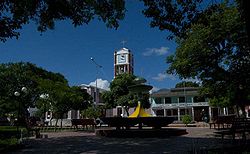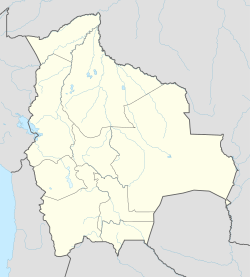Camiri
| Camiri | |
|---|---|

San Francisco church in Camiri
|
|
| Nickname(s): "Capital Petrolera de Bolivia" | |
| Location in Bolivia | |
| Coordinates: 20°6′0″S 63°32′0″W / 20.10000°S 63.53333°WCoordinates: 20°6′0″S 63°32′0″W / 20.10000°S 63.53333°W | |
| Country |
|
| Department | Santa Cruz Department |
| Province | Cordillera Province |
| Municipality | Camiri Municipality |
| Area | |
| • Total | 22 km2 (8 sq mi) |
| • Land | 19 km2 (7 sq mi) |
| • Water | 3 km2 (1 sq mi) |
| Elevation | 812 m (2,664 ft) |
| Population (2012) | |
| • Total | 35,712 |
| • Density | 1,600/km2 (4,200/sq mi) |
| Time zone | GMT-4 |
| Area code(s) | +591 3952 |
| Climate | Cwa |
| Website | Official website |
Camiri (Camirito, La Bomba, Choreti, Capital Petrolera de Bolivia) is a city in Bolivia, Santa Cruz Department, Cordillera Province. It is the seat of the Camiri Municipality. The town has an estimated population of 65,897 inhabitants, also known as "Camireños". Camiri is located on the shores of the Parapeti River in a small valley surrounded by rolling hills on the East, North, and South, and by the Aguarague mountain range on the West. Camiri's "Chaco" Ecosystem encompasses subtropical dry forests with low canopy, and intense xerophilic overgrowth with a large diversity of wildlife.
On February 3, 2007, local protesters shut down a natural gas pipeline in Camiri that serves Southern Bolivia. The protesters were seeking an expansion of the nationolization of the natural gas industry and a renewal of the promise of construction of facilities for YPBF, the national petroleum company.
Camiri has a humid subtropical climate (Köppen: Cwa).
...
Wikipedia

